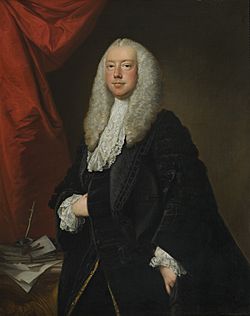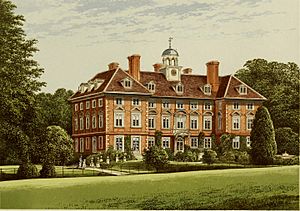Charles Yorke facts for kids
Quick facts for kids
Charles Yorke
|
|
|---|---|

Portrait by Thomas Hudson
|
|
| Lord High Chancellor of Great Britain | |
| In office 17 January 1770 – 20 January 1770 |
|
| Monarch | George III |
| Prime Minister | The Duke of Grafton |
| Preceded by | The Earl Camden |
| Succeeded by | In Commission |
| Personal details | |
| Born | 30 December 1722 London, England |
| Died | 20 January 1770 (aged 47) London, England |
| Alma mater | Corpus Christi College, Cambridge |
Charles Yorke (PC) (born December 30, 1722 – died January 20, 1770) was a very important British lawyer and politician. He briefly held the top legal job in Britain, called the Lord High Chancellor of Great Britain. His father was also a Lord Chancellor, showing that legal work ran in the family!
Charles Yorke started his career as a Member of Parliament (MP), which means he helped make laws for the country. He worked as the Solicitor-General and then the Attorney-General for different governments. During this time, he was well-known for helping to write a very important law called the Quebec Act. He was asked to become Lord Chancellor even though he wasn't sure about it. Sadly, his life ended suddenly just three days after he took on this big role.
Contents
Early Life and Education
Charles Yorke was born in London, England. He was the second son of Philip Yorke, 1st Earl of Hardwicke, who was also a famous Lord Chancellor. Charles went to Corpus Christi College, Cambridge for his education.
Even when he was young, Charles showed he was very good at writing. He worked with his brother Philip on a collection of essays called Athenian Letters. In 1745, he wrote a smart paper about a legal topic called forfeiture (losing property as a punishment). He wrote it to support his father's decisions in important legal cases. The next year, he officially became a lawyer.
Starting His Political Career
Because his father was the Lord Chancellor, Charles got a good job in the Court of Chancery in 1747. This court handled important legal cases. He also became a Member of Parliament (MP) for Reigate. Later, he changed his seat to represent the University of Cambridge.
Charles quickly became well-known in the House of Commons, which is where MPs meet. One of his first speeches supported his father's ideas to change marriage laws. These changes led to the Marriage Act 1753. In 1750, he was chosen as a Fellow of the Royal Society, which is a group of top scientists and thinkers.
Key Legal Roles
In 1751, Charles Yorke became a lawyer for the British East India Company. This was a powerful company that traded with countries like India. In 1756, he was made Solicitor-General. He kept this job when William Pitt the Elder was in charge of the government. Charles was a strong supporter of Pitt's ideas about how Britain should deal with other countries.
He left his job with Pitt in 1761. But in 1762, he became the Attorney-General under Lord Bute. He continued as Attorney-General when George Grenville became Prime Minister in 1763. During this time, he advised the government on a legal issue involving a writer named John Wilkes. Charles said that Wilkes's writings were not treason, but they were still a serious offense. He left this job in November 1763.
Charles Yorke then joined a political group led by Lord Rockingham. In 1765, he became Attorney-General again in Rockingham's government. He helped shape many of their policies. He supported getting rid of the Stamp Act, which was a tax that angered the American colonies. At the same time, he pushed for the Declaratory Act, which said that the British Parliament still had the right to make laws for the colonies.
His most important work was creating the laws for the province of Quebec in Canada. Even after he left office, these laws became the Quebec Act of 1774.
Lord Chancellor and Final Days
In 1766, when Chatham and Grafton came to power, Charles Yorke resigned from his job. For the next four years, he didn't take a big part in Parliament's discussions.
In 1770, the Duke of Grafton asked Charles to become the Lord Chancellor. This was a very high honor, but Charles had promised his political friends that he would not take a job with Grafton's government. King George III personally tried to convince Charles, telling him that if he refused now, he might never get the chance again. Charles finally agreed to the King's request. He was appointed Lord Chancellor and joined the Privy Council on January 17, 1770.
A special document was prepared to make him a noble, giving him the title Baron Morden. However, his life ended suddenly just three days after taking the role, and he never officially became a Baron.
Family Life
Charles Yorke was married two times.
His first marriage was on May 19, 1755, to Katherine Blount Freeman. They had one son:
- Philip Yorke (born May 31, 1757 – died November 18, 1834) later became the 3rd Earl of Hardwicke.
His second marriage was on December 30, 1762, to Agneta Johnson. They had three children:
- Charles Philip Yorke (born March 12, 1764 – died March 13, 1834) also became an important person in government.
- Caroline Yorke (born August 29, 1765 – died July 26, 1818), who married John Eliot, 1st Earl of St Germans.
- Joseph Sydney Yorke (born June 6, 1768 – died May 5, 1831), who became an Admiral in the Royal Navy.
His second wife inherited a beautiful home called Tyttenhanger House, which is near St Albans in Hertfordshire.
 | Claudette Colvin |
 | Myrlie Evers-Williams |
 | Alberta Odell Jones |


